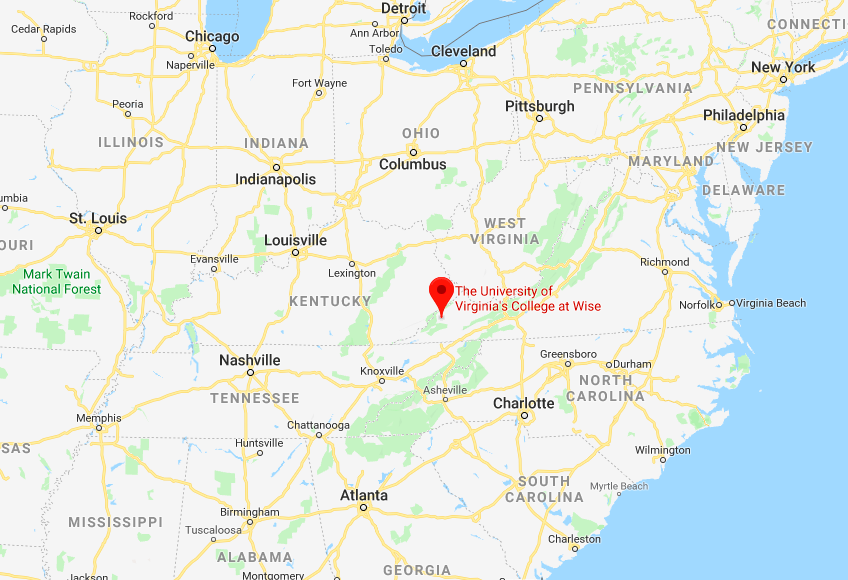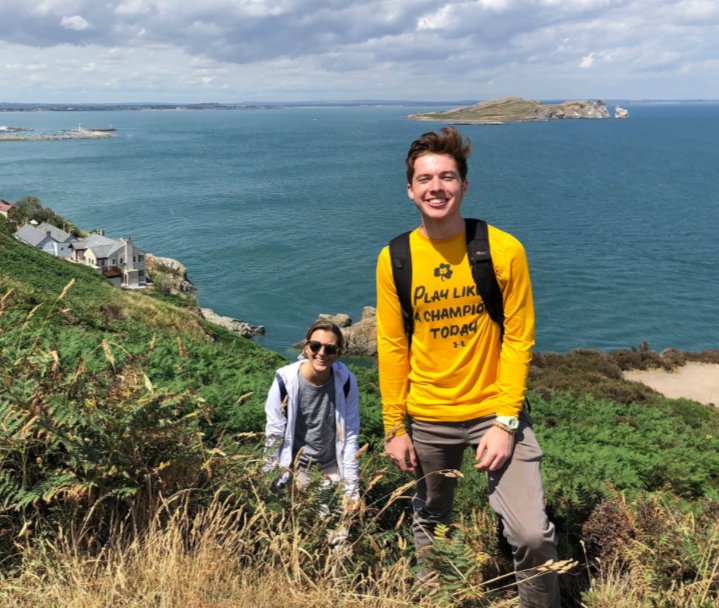While not exactly a “side door,” a new gate has opened to some Virginia students deferred from University of Virginia’s Class of 2023 – as long as they are willing to spend a year in rural Wise, Virginia.
Joining the ranks of colleges offering “alternative” routes to admission, the University of Virginia is proposing that a select group of students postpone starting in Charlottesville and spend a year at UVa-Wise, a small liberal arts college located not far from the Kentucky border.

“We are offering Virginians who were placed on the wait list for the College of Arts and Sciences the opportunity to enroll at the UVA College at Wise located in Southwest Virginia for one year before automatically enrolling at UVA in Charlottesville. Students in this program must complete 30 hours of transferrable credit post high school graduation at UVA-Wise with a 3.0 cumulative GPA or better to transfer into the College of Arts and Sciences at UVA.”
UVa has always had a great relationship with Virginia’s community college system and annually admits students earning two-year associates degrees through a guaranteed admission program. The UVa-Wise transfer offer is something new and wasn’t announced until notices went out to students wait listed for fall 2019 admission to UVa.
But not everyone was excited by the prospect of spending a year in rural Virginia, even if it meant an automatic transfer to the University of Virginia. Students posting on College Confidential had mixed reactions. One noted that UVa-Wise is “very much in the middle of nowhere,” while another pointed out that “it also seems to be a very small school, but maybe that would just mean more a more personalized education for the first year?”
One Fairfax County Public School student didn’t know much about UVa-Wise, but thought his offers at William and Mary and Virginia Tech made better sense for him. While he’s opting to stay on the UVa wait list, he has no intention of beginning his college career in Wise, Virginia. He added, “I don’t know anyone considering the offer.”
A member of the UVa-Wise Class of ’90 was quick to respond, “Is it small? Yes. Is the Town of Wise small? Yes. However, that isn’t necessarily a bad thing for a freshman. The classes are much less overcrowded, but the professors have very high standards and the academic rigor is there. The education is top notch.”
And the underlying message was clear, “If a year in Wise got you a ticket into Charlottesville and that’s your dream school, why not take it?”
Founded in 1954 as the Clinch Valley College of the University of Virginia, UVa-Wise first offered four-year degrees in 1966 and officially changed its name to the University of Virginia’s College at Wise, in 1999.
Since reaching a peak enrollment of 2,420 in 2012, UVa-Wise has steadily decreased in size to the point that the website reports a current enrollment of 2,021.
But having made a significant investment in new facilities, the Commonwealth is not about to let the university fail. Last week, UVa-Wise announced a rollback of the three-percent tuition increased planned for 2019-20, to $11,154—a bit less than the $14,094 in-state tuition (not including UVa’s substantial fees) planned for Charlottesville next year. In return for eliminating the tuition increase, UVa-Wise will receive an additional $235,000 from the Virginia General Assembly.
In addition, the General Assembly recently approved legislation allowing the college to offer reduced tuition to students who live within the Appalachian Regional Commission territory, which stretches from rural New York to Mississippi.
According to a press release, “The law is seen as one way for the liberal arts college, a division of the University of Virginia, to counter the same enrollment drop that is affecting most higher education institutions across the nation.”
But aside from some possible enrollment benefits for UVa-Wise, the University of Virginia is experimenting with a growing trend in higher education, which has created an underground network of alternative admissions offers. And these unexpected options contribute significantly to the confusion and stress faced by college applicants at this time of year.
For example, without apparent regard for harm done to freshman retention rates at other institutions, Cornell University admits students as sophomores, as long as they spend freshman year at another college or university and meet certain academic requirements. Northeastern University admits some freshman provided they study abroad for the first semester, while the University of Maryland admits students for the spring semester and encourages those students to take part in a fall program on campus where they could only take classes late in the afternoon or evening.
At Hamilton College, second semester admits may participate in a “gap” semester or enroll in courses at Arcadia University, at their London campus. The University of Southern California offers the “Trojan Transfer Plan,” through which students are provided with “a clear and predictable path to enrolling at USC for sophomore year” by attending a community college or one of four colleges in Europe. The University of Vermont, Middlebury College, Brandeis University, Rochester University, Michigan State, as well as the University of Tampa all offer second semester admission. And the list goes on.
On the plus side, these alternative admission plans offer students the possibility of attending their dream schools, even though they may not have been admissible as freshmen for the fall semester. On the other hand, these plans provide ways for colleges to dodge reporting lower scores or GPAs for the incoming class and to fill vacancies left by students traveling abroad or transferring out.
But the UVa-Wise offer seems to have a broader objective and could potentially benefit both schools. According to Kathy Still, UVa-Wise communications director, “Accepting students from the deferred list would further strengthen the relationship between Campus and Grounds,” which administratively share UVa President Jim Ryan and the UVa Board of Visitors.
While the College at Wise is unsure how many prospective UVa students will opt to take advantage of the new program, Ms. Still advises that “…interest is high and calls to our admissions office are brisk.” She goes on to add, “The students who enter the program would find an engaging faculty, rigorous academic classes, and they would leave after one year with 30 credit hours under their belts. It’s a win-win situation.”






 A high school student’s personal wellness and college admissions prospects are best served when a student is being authentic. This is as true during the summer as it is during the school year. Sadly, many students don’t know where to begin when it comes to being authentic, no matter the time of year. In addition, many students suffer from the misconception that the most impressive extracurricular accomplishments in the eyes of admissions officers at highly selective colleges and universities are extracurricular activities that cost an arm and a leg. Nothing could be further from the truth. Let me use an example to make my point.
A high school student’s personal wellness and college admissions prospects are best served when a student is being authentic. This is as true during the summer as it is during the school year. Sadly, many students don’t know where to begin when it comes to being authentic, no matter the time of year. In addition, many students suffer from the misconception that the most impressive extracurricular accomplishments in the eyes of admissions officers at highly selective colleges and universities are extracurricular activities that cost an arm and a leg. Nothing could be further from the truth. Let me use an example to make my point. December 14, 2019 Note: The below article is about the 2018-2019 admissions cycle. The only information yet published out of St. Louis about the 2019-2020 admissions cycle is that Wash U. has accepted 708 students Early Decision I (EDI). Check this space for more information about the Wash U. 2019-2020 admissions cycle as we have it. If Wash U. follows trends from the Ivies, and if its lack of any major press release to date is any indication,
December 14, 2019 Note: The below article is about the 2018-2019 admissions cycle. The only information yet published out of St. Louis about the 2019-2020 admissions cycle is that Wash U. has accepted 708 students Early Decision I (EDI). Check this space for more information about the Wash U. 2019-2020 admissions cycle as we have it. If Wash U. follows trends from the Ivies, and if its lack of any major press release to date is any indication, 
 While colleges increasingly emphasize the value of “experiential” or “hands-on” learning within their own communities, high school students are discovering real benefits in setting aside time during their high school careers for internships or other out-of-classroom experiences. In fact, they are finding that internships provide amazing opportunities to gain significant work experience while exploring long-term career options.
While colleges increasingly emphasize the value of “experiential” or “hands-on” learning within their own communities, high school students are discovering real benefits in setting aside time during their high school careers for internships or other out-of-classroom experiences. In fact, they are finding that internships provide amazing opportunities to gain significant work experience while exploring long-term career options. UT at Austin’s Office of Admissions began admitting students to its Class of 2023 on Friday evening December 7 when a few thousand fall 2019 freshman applicants received an email asking them to visit their MyStatus page for an update.
UT at Austin’s Office of Admissions began admitting students to its Class of 2023 on Friday evening December 7 when a few thousand fall 2019 freshman applicants received an email asking them to visit their MyStatus page for an update.